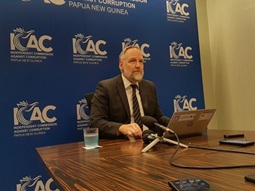The Independent Commission Against Corruption (ICAC) in a media conference today, issued a stark warning, stating that corruption is now actively eroding the very systems designed to uphold Papua New Guinea’s democracy.
This follows a concerning surge in publicly reported incidents of potential corruption involving high-ranking government and political figures in recent weeks.
Deputy Commissioner for ICAC, Mr. Daniel Baulch stated that despite legal obligations under the Leadership Code, these particular individuals have reportedly failed to report suspected corrupt conduct.
Recent events have amplified these concerns whereas in the last fortnight, there were publicly reported incidents regarding potential corruption by those high-ranking government members and politicians.
“This includes a letter, purportedly from the Minister for Finance, directing the release of approximately K73 million in outstanding payments to various businesses.”
“Subsequent reports in the Post-Courier indicated that the Prime Minister intervened to halt these payments. Notably, the finance minister has since been replaced.”
Mr. Baulch also stated that last week, media outlets revealed a court determination on the civil standard that the mining minister had engaged in bribery, allegedly providing vehicles and cash to sway votes during the election.
“Despite these stories, ICAC has received no official reports of suspected corrupt conduct has been made to ICAC about these matters. This silence speaks volume.”
Moreover, Part IV Section 45 (1) of the Organic Law on the Independent Commission Against Corruption (OLICAC) mandates that all leaders subject to the Leadership Code report any suspected corrupt conduct to the ICAC.
The apparent failure to adhere to this legal obligation underscores a serious breakdown in accountability.
“Let us be clear; corruption in PNG is not just about money but it also causes harm. It deprives citizens of essential services such as healthcare, education, and employment opportunities, fuels violence, and in the most extreme cases, contributes to loss of life.”
Despite the claims made, repeated requests were often ignored, meetings did not happen, court processes were delayed and even simple things like getting a search or arrest warrants blocked.
“For twelve months, we have submitted frameworks, drafted national responses and sought high-level coordination to confront PNG’s corruption and crime epidemic.”
Mr. Baulch also briefly addressed recent discussions regarding budget matters and expressed optimism about ongoing positive engagement with the government concerning funding.
He also said that ICAC’s annual budget for this year in which they were told that they would receive is K52 million whereas had made it clear that this funding is not enough.
However, while acknowledging that funding remains a critical factor for operational effectiveness and managing public expectations, he reiterated ICAC’s commitment to proactive investigation.
Meanwhile, ICAC also clarified its distinct role compared to the Ombudsman Commission, emphasizing its primary focus on criminal acts of corruption, particularly bribery and theft of public funds, while welcoming collaboration to avoid duplication of efforts.
He also confirmed discussions with the current finance minister in the coming weeks regarding the efficient delivery of funding moving forward to ensure the agency can operate strategically rather than on a month-to-month basis.
Furthermore, in a direct message to the people of Papua New Guinea, Mr. Baulch urged citizens to utilize the reporting mechanisms available on its website, www.icac.gov.pg and to stand up against corruption.
“People often say; ‘ICAC is the last hope for PNG’. We are doing everything we can to live up to that hope. But we cannot do it alone.”
“We are again asking all leaders in government and public service: Work with us. Take action. Do your duty. Stand up against corruption.”
“We will keep going but we need your help. For the sake of our people, this nation and the future of this country-Be part of the solution, not part of the problem.”


1 Comment
Pingback: dlvr.it